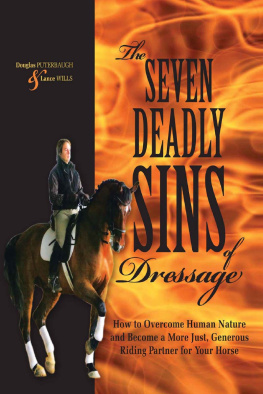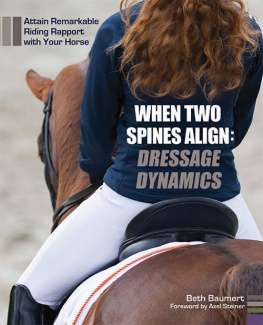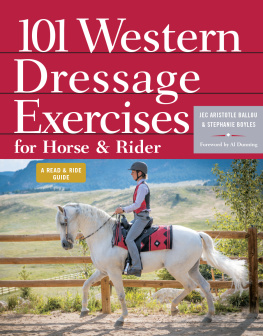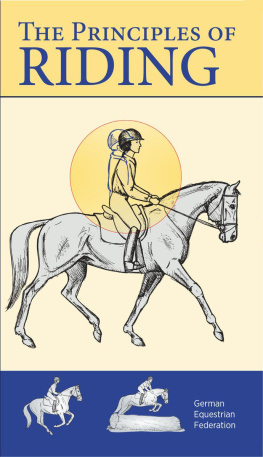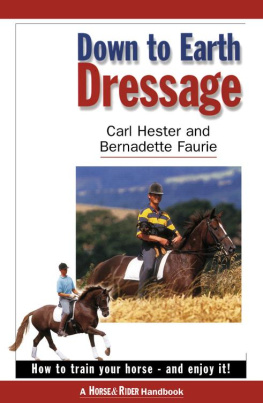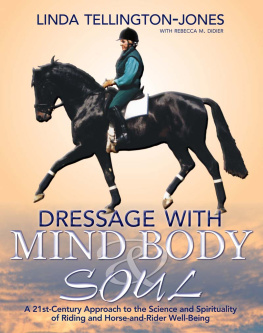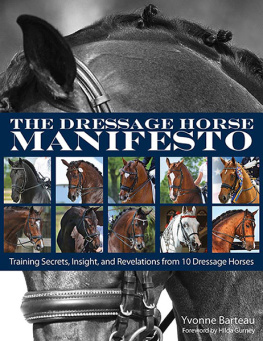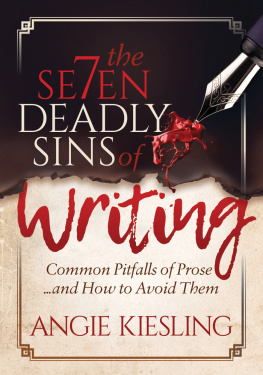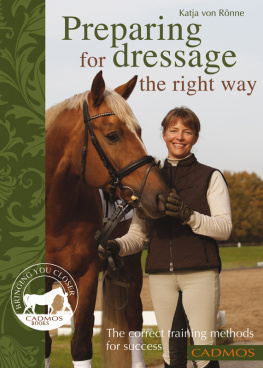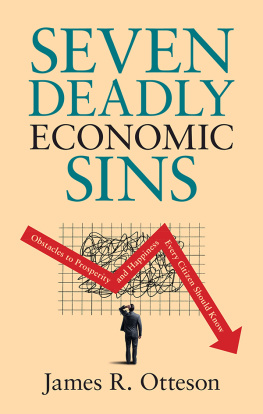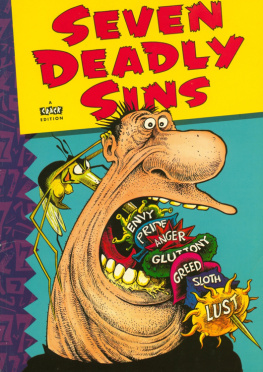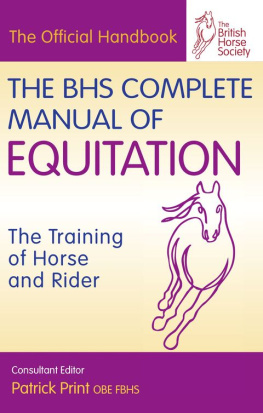
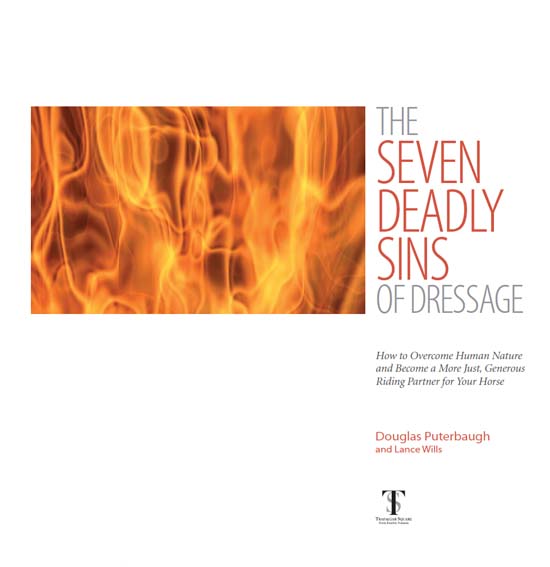
First published in 2012 by
Trafalgar Square Books
North Pomfret, Vermont 05053
Printed in China
Copyright 2012 Douglas Puterbaugh
All rights reserved. No part of this book may be reproduced, by any means, without written permission of the publisher, except by a reviewer quoting brief excerpts for a review in a magazine, newspaper, or website.
Disclaimer of Liability
The author and publisher shall have neither liability nor responsibility to any person or entity with respect to any loss or damage caused or alleged to be caused directly or indirectly by the information contained in this book. While the book is as accurate as the author can make it, there may be errors, omissions, and inaccuracies.
Trafalgar Square Books encourages the use of approved safety helmets in all equestrian sports.
Library of Congress Cataloging-in-Publication Data
Puterbaugh, Douglas.
The seven deadly sins of dressage : how to overcome human nature and become a more just, generous riding partner for your horse / Douglas Puterbaugh with Lance Wills.
p. cm.
Includes index.
ISBN 978-1-57076-485-1 (hardback)
1. Dressage. 2. Horsemanship. I. Wills, Lance. II. Title.
SF309.5.P88 2012
798.23--dc23
2011037905
All photographs by Lance Wills except pp. (courtesy of the author).
Book design by Carrie Fradkin
Cover design by RM Didier
Typefaces: Minion, Myriad, Trade Gothic
10 9 8 7 6 5 4 3 2 1
I would like to dedicate this book to my lovely Tamara, whose kindness, inspiration, and goodness has made me happy for years.

Contents
I have a great emotional respect for the background peoplefor the folks who are not generally includedfor the absentees, the forgotten: the shy nobodies who in the end are best of all.
W ALT W HITMAN
Acknowledgments
T he swan throughout history has inspired poets and composers to praise its beauty, but few take notice of the little webbed feet that transport his silhouette. It is below, underneath, and behind-the-scenes efforts that make all dreams possible. And it is always the behind-the-scenes efforts of those rarely given credit that deserve most to be recognized.
I would like to express my gratitude to Lance Wills, my long-time friend, for his beautiful photographs and tireless effort throughout this project. To Trafalgar Square Books publisher Caroline Robbins for finding value in this book. To Senior Editor Rebecca Didier for her kindness and enthusiasm, as well as her expertise.
Also, a special thanks to Sonja Vracko, my friend and mentor. Bill Biggs for his magnanimous spirit and friendship. Joanie Freeman for her friendship and support. My brother Kenny for his experience and contributions from his music teaching career of many years.
Thank you to the riders who allowed their lovely images to be placed in this book, and the too many to mention who already know they are dear to me.
Introduction
D uring my more than 20 years of observing students and horses, Ive encountered many riders who think of dressage mainly in terms of technique. When they ask, What am I doing wrong? they expect an answer like, You need to have more angle in the shoulder-in, or more bend in the corner. In other words, they expect an answer similar to comments they might receive from a judge at a show.
However, while proper technique is critical, its not the sole determinate for ones development in riding. The character traits you bring to training are as importantor even more soas what you do using this or that approach to training. Not surprisingly, many students tend to overlook the mental aspects of dressage. When given an answer like, Try not to be impatient there, or Give your horse a chance to understand what you want, they often look perplexed, as if the thought had never occurred to them. Sometimes they dismiss the advice outright.
In The Seven Deadly Sins of Dressage I look at the character traits Ignorance, Timidity, Pride, Fear, Impatience, Anger, and Immoderation. The book explores the roles that emotion and attitude play in a riders education and development. It doesnt dwell extensively on techniquethat subject has been written about many times throughout history, and I encourage riders to study their books. In homage, Ive included quotes from many of them throughout the pages ahead.
My seven sins differ from the classic deadly sins of antiquity. The gluttony of the classic deadly sins, for example, refers to an overindulgence of food and drink. But in this reconstitution, gluttony and sloth reside within the sin of Immoderationa mistake that refers to excesses or deficiencies that detract from ones development. In other cases Ive invented sinsIgnorance, Timidity, Impatience, and Fearthat refer specifically to mistakes common to students of dressage.
All of the seven deadly sins of dressage are interconnected. Anger is intimately connected to Impatience. Timidity is related to Fear. And they all arise from Ignorancea lack of knowledge or experience. Its difficult to realize your true potential if you dont know that youre unwittingly sabotaging your own abilities. You cant properly respond to a horses idiosyncrasies without knowing how to read the horse, how to divine the workings of a horses mind and understand his instincts.
The purpose of this book is to help aspiring riders recognize and avoid the pitfalls Ive observed over my riding career. The themes within The Seven Deadly Sins of Dressage begin and continue through the training process, and they end with an ideal that we all aspire to: a better understanding of this old and fascinating subject.
While on this journey, we must remember that when identified and examined in this careful way, every sin can be transformed, and in the end lead to something good:
- Ignorance can lead to knowledge.
- Timidity can become courage.
- Pride can become humility.
- Fear can lead to wisdom.
- Impatience can lead to persistence.
- Anger can become passion (especially with regard to injustice).
- Immoderation can lead to consistency.
Thus, hope springs eternal.
Note to Readers
Ive tried to make this book as gender neutral as possible. When gender-specific pronouns were necessary for the sake of clarity, I refer to riders as she and to trainers and all horses as he. Obviously, this is not because I feel that all riders are women, or that all trainers and horses are male. Neither do I mean to imply that only women fall victim to the sins described in the book, but following my good editors advice, I have adopted her recommendation.
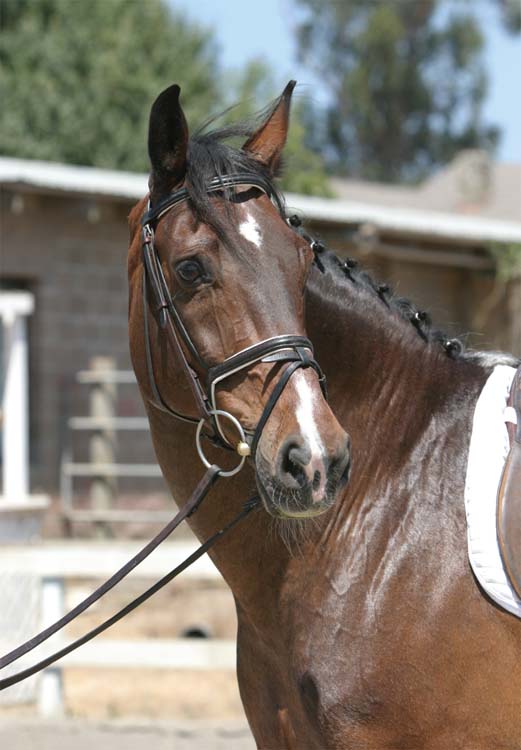
ONE Ignorance
To be conscious that you are ignorant is a great step to knowledge.
B ENJAMIN D ISRAELI
I gnorance hinders any endeavor and dressage is no exception. Success hinges on mastering the subjects many intricacies, so its vital that riders are well-schooled in the techniques and motivations of dressage. What you dont know will hinder your development.
Next page
